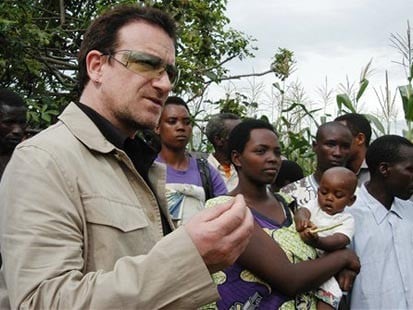 U-2’s front man is an able writer on developmental economics, this much became clear when he penned the foreword to Jeff Sachs’ “The End of Poverty” in 2005. A few days ago, Bono published a column for TIME. His premise: the world is on the cusp of another natural resource boom, and it need not be another case of the infamous “resource curse,” whereby tin pot dictators get richer and the citizens get the slag. He argues:
U-2’s front man is an able writer on developmental economics, this much became clear when he penned the foreword to Jeff Sachs’ “The End of Poverty” in 2005. A few days ago, Bono published a column for TIME. His premise: the world is on the cusp of another natural resource boom, and it need not be another case of the infamous “resource curse,” whereby tin pot dictators get richer and the citizens get the slag. He argues:
In many ways, Africa is to this century what North America was to the 19th. It has 60% of the world’s undeveloped arable land and vast reserves of coal, oil and minerals, together with enormous renewable-energy resources.
Sub-Saharan Africa is also home to 400 million of the world’s poorest people. These resources should be theirs. Get the development of them right and the forthcoming financial resources–invested well–can transform the lives of countless numbers of people.
Transparency in business and government dealings is key to making it happen. It is the vaccine to “the biggest disease of them all”—corruption—“which any African will tell you is killing more kids than HIV/AIDS and malaria combined.”
Obviously Bono’s argument targets African development. Here are three thoughts as it might apply to Latin America:
1) While the pundit-sphere is hot on the scent of US decline, this is one more example where US leadership is indispensible. In 2010, Congress passed a law requiring all companies involved in natural resource extraction that are listed on a US stock exchange to disclose all payments to foreign governments. The EU is still “working on” its version of the measure. Meanwhile, China is doing level best to ensure the old model of crony capitalism keeps thriving.
2) Institutions versus geography: it is perhaps the central debate in developmental economics. Bono is clearly weighing in on the side of the institutions, echoing recent work by Daron Acemoglu. (In fact, the article’s publication date was partly a rallying cry for food security to be on the agenda at the G-8 and G-20 meetings last weekend.) But Bono’s example of sound resource management—the United States in the 1840s—owes to a) the United States had three generations of democratic government under its belt, and b) the country’s natural resources were spread throughout the country, not concentrated in a few areas. Institutions and geography both have some role to play in development, at least that’s the lesson of the United States.
3) Many countries were pleasantly surprised by the commodity boom of the last decade; now many are planning for another round. In Latin America, several countries are crouching over their vast energy reserves, just waiting for the oil and gas to “blow money all over the place,” as Daniel Plainview might put it. Brazil is promising a windfall for everyone. Argentina is more brusque, alienating its largest foreign investor, Spain, by nationalizing the energy company YPF. Cordoning off the assets before they’re fungible means the looming boom might never materialize. Given the downside, Bono’s message is all the more worth repeating.